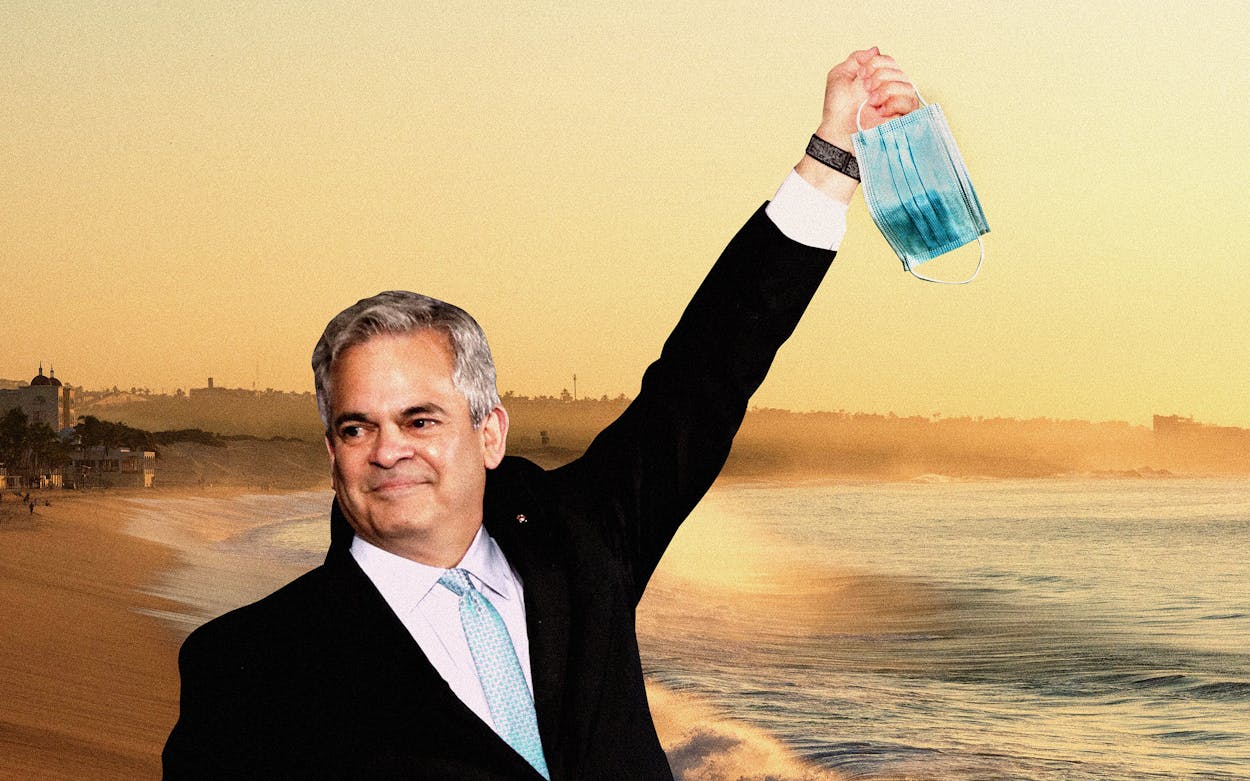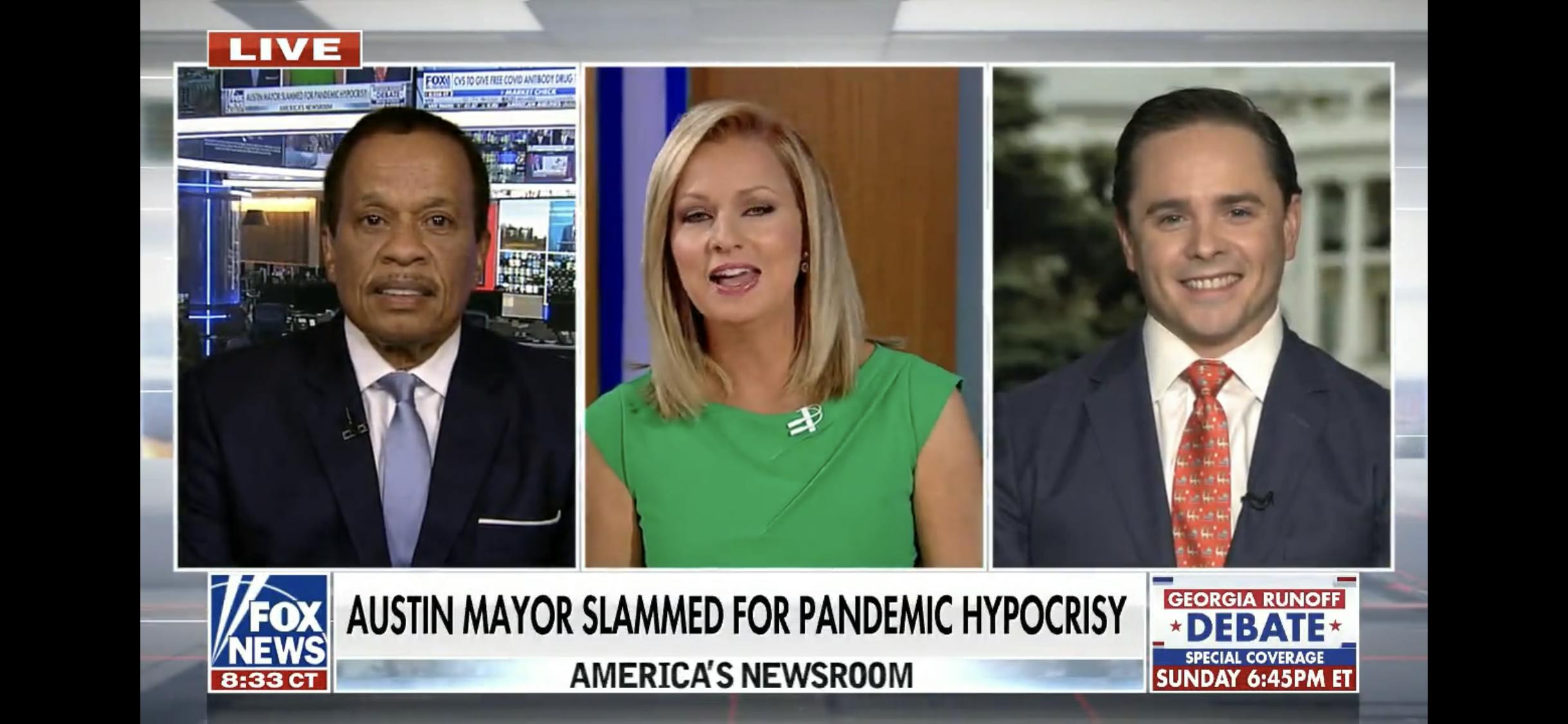There aren’t many Austin residents who have access to better information about the COVID-19 pandemic than Steve Adler. As the city’s mayor, he’s in regular contact with public health officials, infectious disease experts, and epidemiologists. But even for those who rely only on the publicly available COVID dashboards, it was clear in early November that the pandemic was once again taking a turn for the worse in the city. After a rough summer in which new daily COVID-19 cases regularly topped several hundred, Austin successfully bent the curve in the early part of the fall—but as October rolled into November, Travis County cases started trending steadily upward again. Triple-digit daily case counts once again became the norm. Adler’s message to Austinites, informed by this data, was clear: “We need to stay home if you can,” he explained on a Facebook Live address to the city posted on November 9. “This is not the time to relax.”
On Wednesday, the Austin American-Statesman reported that, at the very moment Adler imparted his good advice, his decisions ran contrary to it: he was shooting the video from his vacation timeshare in Cabo, and he’d just attended his daughter’s wedding and reception with twenty guests at a hotel bar off of Austin’s famous South Congress strip. Adler’s family gathering and vacation quickly became national news. “Cabo” trended on Twitter after the report surfaced. Conservative politicians and pundits—who have long targeted Austin for its progressive reputation and the city’s actions on homelessness and police funding under Adler’s leadership—quickly pounced on the mayor.
Hypocrites. Complete and utter hypocrites.
And don't forget @MayorAdler who took a private jet with eight people to Cabo and WHILE IN CABO recorded a video telling Austinites to "stay home if you can…this is not the time to relax." pic.twitter.com/KSvkiwxgga
— Ted Cruz (@tedcruz) December 2, 2020
Adler initially struck a defiant tone. When questioned by a KUT reporter, shortly after news broke, he insisted that “Not only did we not do anything wrong, we didn’t do anything that abrogated or violated the rules or regulations in the city or the conduct that we were expecting of others.” Hours later, his stance softened some. He issued a written apology, and Wednesday evening, on a video address with the emotional affect of a hostage video, he repeated he was regretful. When reached by Texas Monthly on Thursday morning, Adler wasn’t available for an interview, but his office sent a brief statement. “I regret this travel,” it read. “I wouldn’t travel now, didn’t over Thanksgiving and won’t over Christmas. But my fear is that this travel, even having happened during a safer period, could be used by some as justification for risky behavior. In hindsight, and even though it violated no order, it set a bad example for which I apologize.”
That Adler’s travel violated no city order is true, but it’s also not the point. During the pandemic, Texans have faced a tension between what they are allowed to do and what’s actually advisable behavior. State officials have mostly avoided imposing new restrictions by urging “personal responsibility,” an approach that largely translates to “do what you want and deal with it if you get sick.” Austin, however, has consistently pushed its residents to regulate their behavior more strictly than the law dictates, setting up risk-based guidelines that encourage responsible behaviors without the force of law behind them. It wouldn’t have violated an order for Adler to drive outside of city limits to host an enormous Thanksgiving dinner for a bunch of strangers in an unventilated warehouse, for example, but that wouldn’t have been a responsible decision. (Adler’s statement stressing that he didn’t travel for Thanksgiving seems to indicate that he understands the distinction.) What’s more, Adler’s behavior did not just put himself, and those around him, at personal risk. His hypocrisy has profound political implications.
There are Texans who take the pandemic seriously who outsource their understanding of what is safe and what isn’t to their leaders. In Austin, which has weathered the pandemic better than most large Texas cities—Travis County is the fifth largest in the state, but thirteenth in active COVID-19 cases—locals have done well by following Adler’s words, if not his actions. In the last nine months, countless brides- and grooms-to-be postponed their weddings; countless mourners said goodbye to their loved ones via Zoom funerals. Not every single gathering or trip during the pandemic leads to an outbreak, but if all Austinites who sacrificed instead behaved the way that Adler did, the city would likely be looking at an even starker epidemic.
Further, as mayor of the city in which conspiracy theorist Alex Jones has led several rallies declaring the pandemic to be a hoax, and in which right-wing demonstrators have regularly gathered to protest various state public health orders, Adler knows how politicized the response to the pandemic has been. One of his key responsibilities has become countering rampant misinformation about the seriousness of the coronavirus. Instead, he gave those who peddle that misinformation, such as Jones, a new talking point. Arguments that policies intended for the public good are too strict gain purchase when leaders who have access to the best information about the pandemic—including Adler, California governor Gavin Newsom, Denver mayor Michael Hancock, San Francisco mayor London Breed, and San Jose mayor Sam Liccardo, etc.—seem to decide that it’s safe to live life more or less normally. (The infectious disease experts and epidemiologists who actually understand the information folks including Adler have access to are staying home.)
Adler also squandered much of his remaining political capital on his trip to the beach. Leaders at the state level have repeatedly targeted actions that Austin has taken, even locally popular ones. After the city passed a public camping ordinance that made life easier on homeless Austinites, the state sent TxDOT to “clean up” camps along highways. After Adler and the Austin City Council voted to slash the police budget by one third this summer, Governor Greg Abbott announced he would consider a proposal that would punish local governments that cut police budgets and a measure that would allow state troopers to control policing in certain parts of Austin. As the mayor of a city with hostile statewide leadership, Adler’s margin for error is slim. Opening himself up to charges that he’s a hypocrite plays directly into a line of attack that’s been wielded against the city for years, at a time when the Texas Legislature can score easy points by pursuing measures that undo his agenda.
More than any of that, though, Adler’s decision to host a large family gathering and follow it up with a trip to Mexico, eight months into a pandemic, comes off as deeply selfish. Austin business owners have struggled to maintain their livelihoods and those of their employees while also managing public safety responsibilities that were thrust upon them in the absence of clear rules or much-needed financial relief. Everyone has made sacrifices during the pandemic, and part of how we justify those sacrifices is through a sense of solidarity—that we’re all doing our part, that we’re not the only ones who miss our families or our vacations or our celebrations of life’s big moments. When the mayor betrayed those ideals, that solidarity was damaged—and it will take more than an apology to restore it.
- More About:
- Politics & Policy
- Pandemic
- Steve Adler
- Austin









